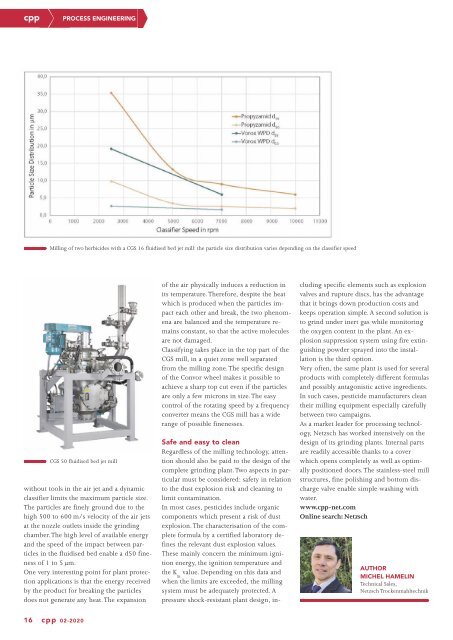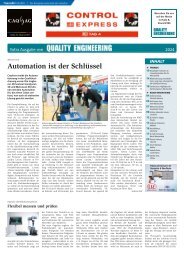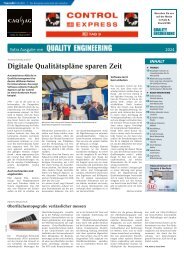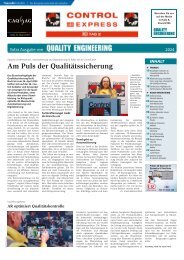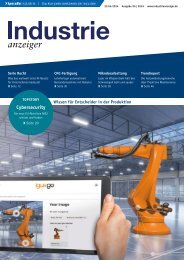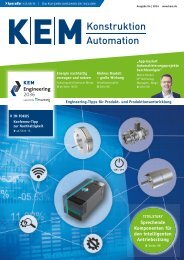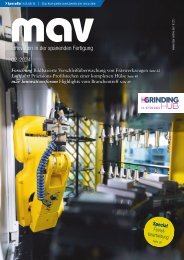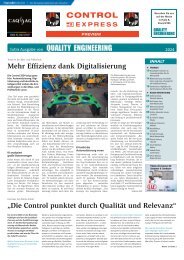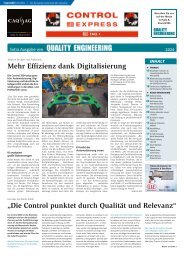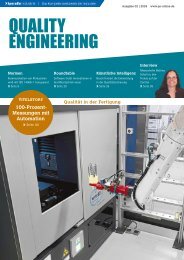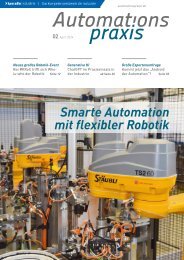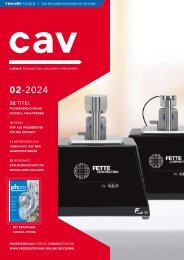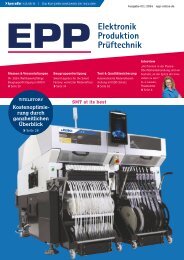cpp – Process technology for the chemical industry 02.2020
The journal cpp - Process technology for the chemical industry reports about processes, plants, apparatus and components for the chemical and pharmaceutical industry. Further topics are IT technologies, industry 4.0, digital production, MSR and automation technology and process analysis technology. The content spectrum is rounded off by explosion protection, plant safety, occupational health and safety, maintenance, site management and energy management.
The journal cpp - Process technology for the chemical industry reports about processes, plants, apparatus and components for the chemical and pharmaceutical industry. Further topics are IT technologies, industry 4.0, digital production, MSR and automation technology and process analysis technology. The content spectrum is rounded off by explosion protection, plant safety, occupational health and safety, maintenance, site management and energy management.
Create successful ePaper yourself
Turn your PDF publications into a flip-book with our unique Google optimized e-Paper software.
<strong>cpp</strong><br />
PROCESS ENGINEERING<br />
Milling of two herbicides with a CGS 16 fluidised bed jet mill: <strong>the</strong> particle size distribution varies depending on <strong>the</strong> classifier speed<br />
CGS 50 fluidised bed jet mill<br />
without tools in <strong>the</strong> air jet and a dynamic<br />
classifier limits <strong>the</strong> maximum particle size.<br />
The particles are finely ground due to <strong>the</strong><br />
high 500 to 600 m/s velocity of <strong>the</strong> air jets<br />
at <strong>the</strong> nozzle outlets inside <strong>the</strong> grinding<br />
chamber. The high level of available energy<br />
and <strong>the</strong> speed of <strong>the</strong> impact between particles<br />
in <strong>the</strong> fluidised bed enable a d50 fineness<br />
of 1 to 5 μm.<br />
One very interesting point <strong>for</strong> plant protection<br />
applications is that <strong>the</strong> energy received<br />
by <strong>the</strong> product <strong>for</strong> breaking <strong>the</strong> particles<br />
does not generate any heat. The expansion<br />
of <strong>the</strong> air physically induces a reduction in<br />
its temperature. There<strong>for</strong>e, despite <strong>the</strong> heat<br />
which is produced when <strong>the</strong> particles impact<br />
each o<strong>the</strong>r and break, <strong>the</strong> two phenomena<br />
are balanced and <strong>the</strong> temperature remains<br />
constant, so that <strong>the</strong> active molecules<br />
are not damaged.<br />
Classifying takes place in <strong>the</strong> top part of <strong>the</strong><br />
CGS mill, in a quiet zone well separated<br />
from <strong>the</strong> milling zone. The specific design<br />
of <strong>the</strong> Convor wheel makes it possible to<br />
achieve a sharp top cut even if <strong>the</strong> particles<br />
are only a few microns in size. The easy<br />
control of <strong>the</strong> rotating speed by a frequency<br />
converter means <strong>the</strong> CGS mill has a wide<br />
range of possible finenesses.<br />
Safe and easy to clean<br />
Regardless of <strong>the</strong> milling <strong>technology</strong>, attention<br />
should also be paid to <strong>the</strong> design of <strong>the</strong><br />
complete grinding plant. Two aspects in particular<br />
must be considered: safety in relation<br />
to <strong>the</strong> dust explosion risk and cleaning to<br />
limit contamination.<br />
In most cases, pesticides include organic<br />
components which present a risk of dust<br />
explosion. The characterisation of <strong>the</strong> complete<br />
<strong>for</strong>mula by a certified laboratory defines<br />
<strong>the</strong> relevant dust explosion values.<br />
These mainly concern <strong>the</strong> minimum ignition<br />
energy, <strong>the</strong> ignition temperature and<br />
<strong>the</strong> K St<br />
value. Depending on this data and<br />
when <strong>the</strong> limits are exceeded, <strong>the</strong> milling<br />
system must be adequately protected. A<br />
pressure shock-resistant plant design, including<br />
specific elements such as explosion<br />
valves and rupture discs, has <strong>the</strong> advantage<br />
that it brings down production costs and<br />
keeps operation simple. A second solution is<br />
to grind under inert gas while monitoring<br />
<strong>the</strong> oxygen content in <strong>the</strong> plant. An explosion<br />
suppression system using fire extinguishing<br />
powder sprayed into <strong>the</strong> installation<br />
is <strong>the</strong> third option.<br />
Very often, <strong>the</strong> same plant is used <strong>for</strong> several<br />
products with completely different <strong>for</strong>mulas<br />
and possibly antagonistic active ingredients.<br />
In such cases, pesticide manufacturers clean<br />
<strong>the</strong>ir milling equipment especially carefully<br />
between two campaigns.<br />
As a market leader <strong>for</strong> processing <strong>technology</strong>,<br />
Netzsch has worked intensively on <strong>the</strong><br />
design of its grinding plants. Internal parts<br />
are readily accessible thanks to a cover<br />
which opens completely as well as optimally<br />
positioned doors. The stainless-steel mill<br />
structures, fine polishing and bottom discharge<br />
valve enable simple washing with<br />
water.<br />
www.<strong>cpp</strong>-net.com<br />
Online search: Netzsch<br />
AUTHOR:<br />
MICHEL HAMELIN<br />
Technical Sales,<br />
Netzsch Trockenmahltechnik<br />
16 <strong>cpp</strong> 02-2020


